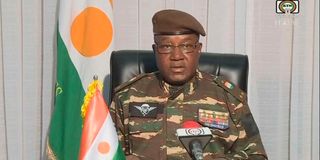ECOWAS, African Union play catch-up on Niger coup

This video frame grab image obtained by AFP from ORTN - Télé Sahel on July 28, 2023 shows General Abdourahamane Tchiani, Niger’s new strongman, speaking on national television and reads a statement as "President of the National Council for the Safeguarding of the Fatherland", after the ouster of President-elect Mohamed Bazoum.
What you need to know:
- ECOWAS issued a seven-day ultimatum to the military to reinstate ousted President Mohamed Bazoum, just as African Union (AU) said the junta had 15 days from Friday to reverse the coup
The Economic Community of West African States (ECOWAS) and the African Union say Nigerien coup plotters have a maximum of 15 days to reverse their illegal takeover of power in the country.
But the warnings, coming two days after the junta formally installed an interim ‘President’ may highlight the catch-up from regional leaders trying to forestall a dangerous pattern of coups in West Africa.
On Sunday, ECOWAS issued a seven-day ultimatum to the military to reinstate ousted President Mohamed Bazoum, just as African Union (AU) said the junta had 15 days from Friday to reverse the coup.
An emergency meeting of the Economic Community of West African States (ECOWAS) on Sunday in Abuja, threatened far-reaching sanctions on the coup leaders if they failed to meet the deadline.
ECOWAS threatened some sort of military action and also to impose a no-flight zone and closure of land borders on the Niger Republic just as the African Union (AU) through its Peace and Security Council (PSC) on July 28, 2023, in Addis Ababa, demanded the military to immediately and unconditionally return to their barracks.
ECOWAS, which recognised President Bazoum as the legitimate President of the nation, also threatened to impose land border closures and no-fly zone conditions on the Niger Republic should the military coup masterminds fail to heed its ultimatum.
The communiqué read by the President of the ECOWAS Commission, Omar Touray, also rejected any form of resignation that may purportedly come from the embattled President Bazoum.
“In the event, the Authority’s demands are not met within one week, ECOWAS will take all measures necessary to restore constitutional order in the Republic of Niger.’’
They listed some other measures as the suspension of all commercial and financial transactions between ECOWAS Member States and Asia with Niger.
Others include the freezing of all service transactions including energy transactions.
``Freeze assets of the Republic of Niger in Aqua Central Bank. Freeze of assets of the Niger State and the state enterprises and parastatals in commercial banks.
“Suspension of measure from all financial assistance and transactions with all financial institutions, particularly EBID”, he said.
The US promptly endorsed the decision saying the Nigerien military must not damage the country’s “hard-earned democracy.”
“The United States further welcomes the dispatch of the special representative of the ECOWAS Chair to Niger and urges all parties to work with ECOWAS for a peaceful and expeditious resolution of the current situation,” said Antony Blinken, the US Secretary of State.
ECOWAS addressed the chaos in Niger, just hours after the African Union Peace and Security Council published the contents of its decisions made on July 28 including the immediate and unconditional release of President Bazoum.
AU also urged the military to release all other detainees, and to “respect human rights, including protection of their physical health and moral integrity” and warned that Security Council will take necessary action, including punitive measures against the perpetrators.
The PSC also expressed AU’s ``deep concern over the alarming resurgence of military coups d’état which undermine democracy, peace, security and stability in the Continent; and reiterates its zero tolerance for unconstitutional changes of government.”
As is tradition, juntas have often been suspended from the African Union meetings including being banned from voting. Yet the pattern in West Africa, mostly in francophone countries, has often been that these military chiefs then get gradually re-admitted in the international fold.
In the past three years, Mali, Guinea and Burkina Faso have all had militaries deposed elected leaders, ostensibly in protest against their failure to address mounting security problems. In Niger, the presidential guards who masterminded the coup blamed President Bazoum for sitting on his hands as insurgencies mount in the country. And the coup has been relatively popular among some citizens who agree with the soldiers on the government’s failures.
Mali, Burkina Faso and Guinea are still suspended from participating in decision-making at the African Union. But the initial blockade imposed on them, including against trading with neighbours in West Africa has since been lifted in a subtle acceptance of the juntas.
ECOWAS, nonetheless, has often given ultimatums on the three to push through a transition calendar to civilian governments.
On Sunday, ECOWAS said it was deploying Benin President Patrice Talon as special envoy to Niger to help reverse the course.
“Africa has come of age; we reject coup and interruption to constitutional order,” Tinubu had said after the Nigerien military installed Gen Abdourahamane Tchiani.
“As African leaders, it is our sheer responsibility to foster stability and progress, placing the wellbeing of our people at the forefront of our endeavours.
Meanwhile, the European Union and France separately said they had suspended aid to Niger following the incident.





